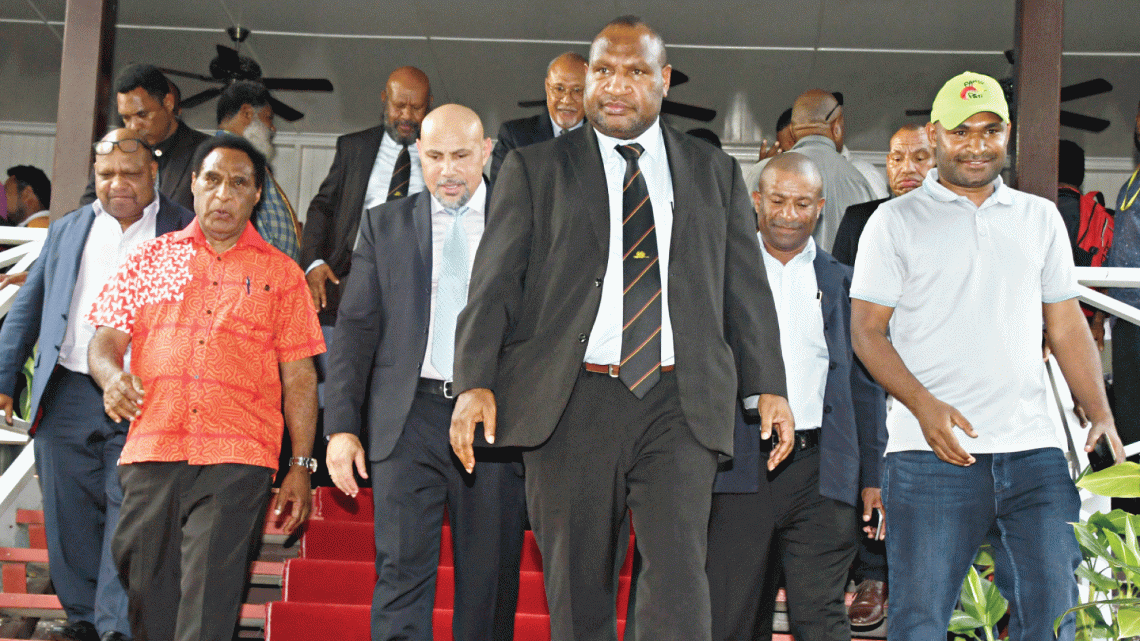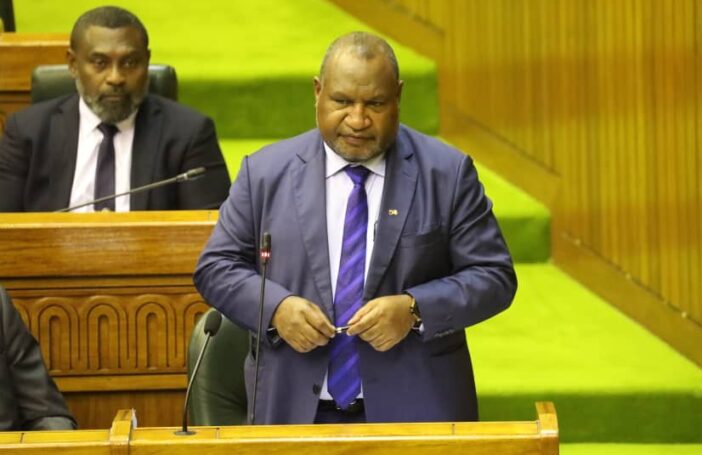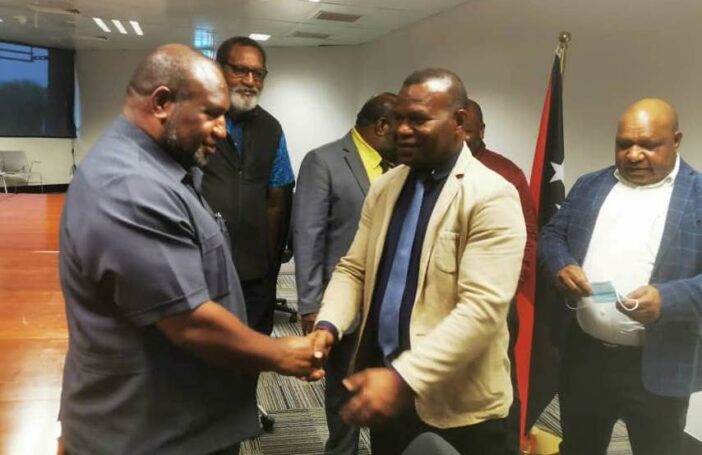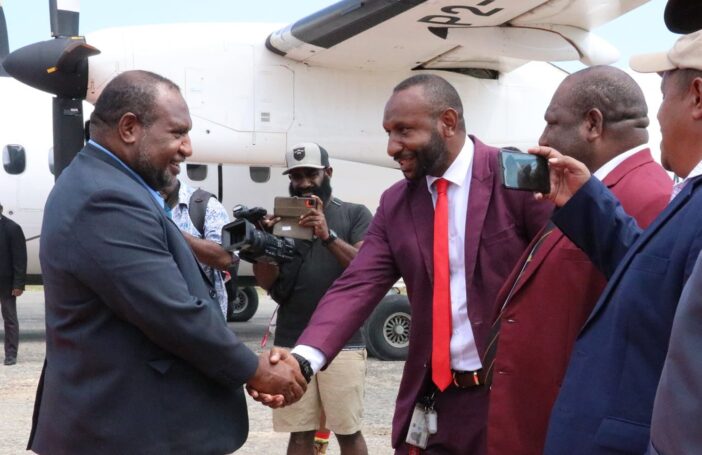On 10 September 2019, the Opposition Leader of the Government of Papua New Guinea (PNG) and leader of the National Alliance party, Patrick Pruaitch joined the government coalition led by Prime Minister James Marape, a member of the Pangu Pati. Such fluidity in PNG politics is nothing new. It was even expected, after National Alliance members Allan Bird, Walter Snaulbelt, Ian Ling-Stuckey and Peter Isoaimo, along with other opposition MPs, including Mekere Mourata and Garry Juffa, joined the Marape-led coalition at the end of August 2019. What is of interest is the composition of the government coalition: Mekere Mourata, the opposition nominee who challenged Marape for the prime minister’s position on 30 May 2019; Patrick Pruaitch, the opposition leader who sought a Supreme Court reference questioning Marape’s election; and about six MPs who did not vote for Marape on 30 May.
As part of the recent reshuffle, Marape removed the People’s National Congress (PNC) led by former Prime Minister Peter O’Neill from the coalition on 26 August, and took away the treasury portfolio from senior PNC MP Richard Maru, giving it instead to National Alliance MP Ian Ling-Stuckey. Marape was a member of the PNC four months ago. All 22 current PNC MPs, and those who resigned from the party before and after the 30 May election, voted for Marape as PM. Some PNC MPs, like Justin Tkachenko, Minister for Housing, have said they will support Marape’s government, which has been seen by many as a bid to avoid losing their ministerial portfolios. On 28 August Peter O’Neill said that all 22 PNC MPs, including the eight ministers would remain with the government despite having been asked to leave the government. Two days later, Marape reiterated Pangu Pati’s position saying that they had severed ties with PNC as coalition partners. However, he added that it was up to the PNC party and MPs to choose whether they wished to remain with the government or leave. On 16 September, Nick Kuman, PNC MP and Minister for Higher Education in the Marape government announced his resignation from the party.
Marape is now surrounded by an assortment of MPs: those who voted for him, those who did not vote him, and those who wanted to see his election declared null and void. This assorted pattern extends to political parties.
Of the 28 MPs of the Pangu Pati, only six are original Pangu Pati MPs who contested for and won under the Pangu Pati banner in the 2017 elections. The other 22 are an assortment from PNC and other parties who joined Pangu between April and May 2019. Nine of the original Pangu Pati MPs are now members of the Melanesian Alliance party, after leaving Pangu Pati in April 2019. Melanesian Alliance is also in the coalition, led by former Pangu Pati leader Sam Basil. Some are single-member parties – Gary Juffa (People’s Movement for Change), Kerenga Kua (Papua New Guinea Party) and Brian Kramer (Allegiance Party). Kua and Kramer left the opposition to join the government in early June 2019 after Marape’s election, and were given the Ministries for Petroleum & Energy and Ministry of Police respectively. Neither MP voted for Marape. Kua voted against Marape and Kramer was absent during his election. At the moment, Marape lacks the support of a strong political party. This coalition of assorted parties is not even united by clear policies.
For instance, at the 2019 PNG Update, Marape implied that he would remove tuition-free education for secondary schools. Such a move goes against his Pangu Pati’s position, which, along with coalition partner National Alliance, advocate for “subsidized” school fees. Coalition partners Social Democratic Party and People’s Progress Party support free education. It remains to be seen whether Marape is serious about abolishing free education.
What explains the movement of MPs to the government side? In previous articles (here and here), I argued that ministerial portfolio allocations seem to be a possible explanation for coalition politics in PNG. However, governors who have moved from the opposition to the government cannot take on ministries. Reforms introduced in 1995 make it mandatory for a governor to relinquish their position if they are appointed a ministerial portfolio. Some open MPs like Mekere Morauta, who is eligible for a ministerial portfolio was not given one.
Why are MPs content to move to the government despite no ministry allocation? There are three possible explanations. First, Marape says he invited the MPs because of their experience, such as Mekere Morauta to rescue the economy. It may be that Marape wants experienced MPs regardless of their party. Second, Marape may want to keep on his side all those MPs who would otherwise be critical of the government and who have the ability to sway public opinion. This would help to explain Brian Kramer and Kerenga Kua’s presence, and now Gary Juffa and Alan Bird. Many in PNG credit these MPs with bringing down Peter O’Neill. Third, Marape needed a major coalition partner in National Alliance with its 19 MPs to replace PNC. All of these MPs who moved recently have accused Peter O’Neill of corruption and at times called for him to step down as PM. They would be content to see Peter O’Neill moved to the opposition and subsequently investigated. Gary Juffa said his condition for moving to the government had been that PNC and Peter O’Neill were removed from the government side.
The assorted MPs and parties in the Marape coalition government are loosely held together by ministerial portfolio allocations, Marape’s desire to strengthen his coalition and employ experienced MPs, and a common desire to see PNC and Peter O’Neill removed from the government and investigated.
Correction 24/09/2019: Kerenga Kua belongs to the PNG National Party, not the PNG Party as originally stated. Also, in the recent reshuffle Marape took away the national planning portfolio from Richard Maru, a senior PNC MP and gave it to Sam Basil, leader of Melanesian Alliance, who at the time had the treasury portfolio. The treasury portfolio was then given to National Alliance MP Ian Ling-Stucky.





Despite PNG’s economic boom led by extractive industries, almost 40% of the country’s population lives in poverty. The Government has not taken sufficient steps to address gender inequality, violence, corruption, or excessive use of force by Police. Today a MP forget what they suppose to do but they ignore.
Thank you Michael for an great blog and excellent insights.
I really enjoyed reading it. It was very interesting to read how you connected the ministries to the coalitions. Clearly, the carving up ministerial portfolios is a very important part of the political economy of political coalitions and settlements in PNG.
Things seem to be moving very fast.
On a lighter note, this week I had a dream that Marape and O’Neill got back together again! I am already trying to interpret this dream…
We have an interesting two years ahead.
tenkiu tru.
Michael thanks for this discussion.
You look closely at the events that unfold and realise that Marape did not remove PNC-majority of the PNC members are still with the government-it could be hard for Marape to do that. Former Minister for National Planning was removed not because of PNC, it was due to the EU Agricultural loan approval delay caused by Maru but spearheaded by ES Governor Bird and Maru’s continued communication with former PM O’Neill while under Marape-Davis government.
One point that is intellectually critical is this: Marape is yet to assume leadership of the Pangu Parti. Without this, he cannot entirely dismiss PNC, of which he was a core member. Once O’Neill is implicated in allegations, the PNC leadership is going to be vacant, non-other than Marape is the likely successor.
The PNC party has a strong hold in the Highlands, especially Hela, SHP, Enga. Marape knows this fact, and he cannot dismiss PNC. This understanding is confirmed by what Marape said when he gave opportunity for the eight PNC ministers to decide for themselves, either to leave government or to stay with them.
Your discussion on assorted MPs hanging under Marape-Davis government, it goes back to the fluidity of the political party system we have and the prevailing status quo of today’s politics. The particular section of the “integrity law on political parties and candidates” that restricts movement of MPs in government and opposition and from one political party to another has been rendered null and void so now you see the results.
Marape sits in three situations:
1. He will take over the leadership of PNC once O’Neill is implicated and resign, PNC has a strong hold in the Highlands. 2. At the moment he is yet to be given the Pangu Parti leadership, which Pangu executives would not want to do but leave it to a later time.
3. Whilst this, Marape wants to deliver on some national agendas and he needs the likes of competent MPs in the former government and the opposition. That’s why you see exodus of likeminded MPs moving to one side.
However, one immediate number game that Marape needs to get it right is the balance of convenience to govern; in the event of PNC move to the opposition with 22 or so MPs, he needs to pull in NA party to balance it. That is why we have witnessed the recent move by Pruaitch and the NA team.
More update to come.
In my commentary above (second paragraph), I made a mention of Pangu leadership, today’s news paper has confirmed my assertion that PM Marabe assumed the Pangu leadership.
This could create more movement to the balance of power or the emergence of political risks as I alluded to in my subsequent paragraphs above.
Stay tune and I will continue to provide the updates.
Hi JK Domyal,
Thanks for your comments. Always an interesting read. Looking forward to insightful updates. Cheers.
Hi all, thanks for the comments and corrections (Francis, Amanda, and Bernard) on Kua’s party – PNG National Party, and Richard Maru’s portfolio – National Planning. A correction will be provided at the end of the blog. Thanks again.
Thank you Mr Michael Kabuni for this very interesting, insightful piece.
As others have said, Hon. Richard Maru was Minister for Planning before the recent changes. He had been in the role for some time, having survived the change of Prime Minister.
You mentioned the PNG Update conference held at UPNG this year, as the Prime Minister James Marape spoke on the first morning. Hon. Richard Maru spoke as then Minister for Planning on the second morning, and his well-received address is available at the same link you provided (https://devpolicy.crawford.anu.edu.au/png-and-pacific-updates/png-update).
Thanks again for the helpful write-up.
Good read. As pointed out by Francis, Maru was Minister for National Planning. Kua is the leader of the National Party.
Mate, excellent take.
I thoroughly enjoyed reading this piece.
Dear Michael Kabuni,
Bro, a very useful and insightful assessment of the current coalition government. I do most certainly concur that the Prime Minister James Marape doesn’t have the benefit of a strong coalition government comprised of political parties with similar party policies or party policy platforms while in the current Marape-Davies Government.
The political chess-board is littered with so many “political kings” and “political queens” that one could safely describe the current political sitting arrangements as a “political marriage of convenience” on the floor of Parliament. It defies the existing political project as to how Prime Minister James Marape could politically attract such a diverse political range of Members of Parliament with very diverse and or opposing political positions into his government as we move ever so closely towards the finalisation of the 2020 Development Budget for Papua New Guinea.
While there is a huge demarcation between political imaginary lines and political party lines in the political project in Papua New Guinea, that is not to say that the Marape-Davis Government isn’t intact going into the 2022 General Elections. If I could highlight the political Newtonian aspect of this complex political vegetation, it is that a lot depends on James Marape and Davies Steven’s political instinct and political leadership.
At the end of the day, the focus is on working towards achieving the concept of “Take Back PNG”. In political parlance, this is a lot like “looking for the elephant’s footprints in the forest. When in reality, the elephant is at home”.
A very good analysis. Only one correction. The Minister for Treasury was Hon. Sam Basil who was replaced by Hon Ian Ling Stucky. Hon Basil replaced Hon Richard Maru.